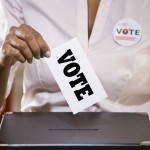 Across the democratic world, there has been a general trend of declining voter turnout over the past few decades, with many attributing this decline to a general disillusionment towards politics and indifference towards politicians. Research from MIT suggests that a somewhat surprising factor can also influence voter turnout.
Across the democratic world, there has been a general trend of declining voter turnout over the past few decades, with many attributing this decline to a general disillusionment towards politics and indifference towards politicians. Research from MIT suggests that a somewhat surprising factor can also influence voter turnout.
The researchers found that when the minimum wage was raised in New York City in the mid-2010s, it corresponded with a 3% rise in voter turnout among people earning around that minimum level. Similar rises were found when they examined other parts of the country going back to the 1980s.
“We found that people who get a raise because the minimum wage goes up become slightly more likely to vote in the next election,” the researchers say. “Those people, who are low-income, [become] represented a little better in elections than they typically are, because people with low incomes tend to vote less.”
On the rise
The study finds that the minimum wage has been risen across the United States since 2014, with the issue often prominently featured in local and state politics. This is despite the federal minimum wage not being raised since 2009. States are free to do their own thing, however, and many have raised their minimum wage far above the federal level. For instance, the District of Columbia, Washington, and Massachusetts all have minimum wage levels twice that of the federal level.
The researchers focused on voter turnout in New York City before and after the city raised the minimum wage in 2014 and 2015. They then attempted to compare any changes in voting among workers earning around the minimum wage with those who weren’t affected by the raises.
“If everybody’s turnout changes from one year to another, we’re accounting for that,” they explain. “We’re focused on the bit of change that is being driven by the minimum wage increase, because it’s driven by this set of [workers].”
Comparing states
Because states have very different minimum wage standards, this variation allows the researchers to examine the precise impact such policy changes can have on voter turnout.
“From a social science [research] perspective, that kind of policy patchwork is really helpful, because you can compare states that increased their minimum wage to ones that didn’t,” the researchers explain.
While the research doesn’t identify quite why a rise in the minimum wage seems to encourage people to vote more, the authors hypothesize that not only do people have more time to vote when they’re better off, but they’re also more engaged in society and therefore more open to the value of voting.
“We can imagine a couple of possible mechanisms here,” they say. “One is the possible material or logistical changes that happen when people make substantially more money [and can] afford stable housing and regular transportation. When you have a little more money to live, you have a little more head space to think about going to vote. When you’re struggling with basic needs, you’re going to have a harder time to participate in an election.”
Obviously, it’s an issue that deserves greater exploration, and the team hopes to do that so that they can better understand the role the minimum wage regulations can play in political engagement and voter turnout.
“What I would like to see is more evidence that arises from talking to minimum wage workers, whether it is more qualitative work involving a lot of interviews, or also possible survey work,” the authors conclude. “More of that work would tell us what’s actually going through people’s heads when they see this kind of change. … I think there would be a lot of value to someone doing that.”